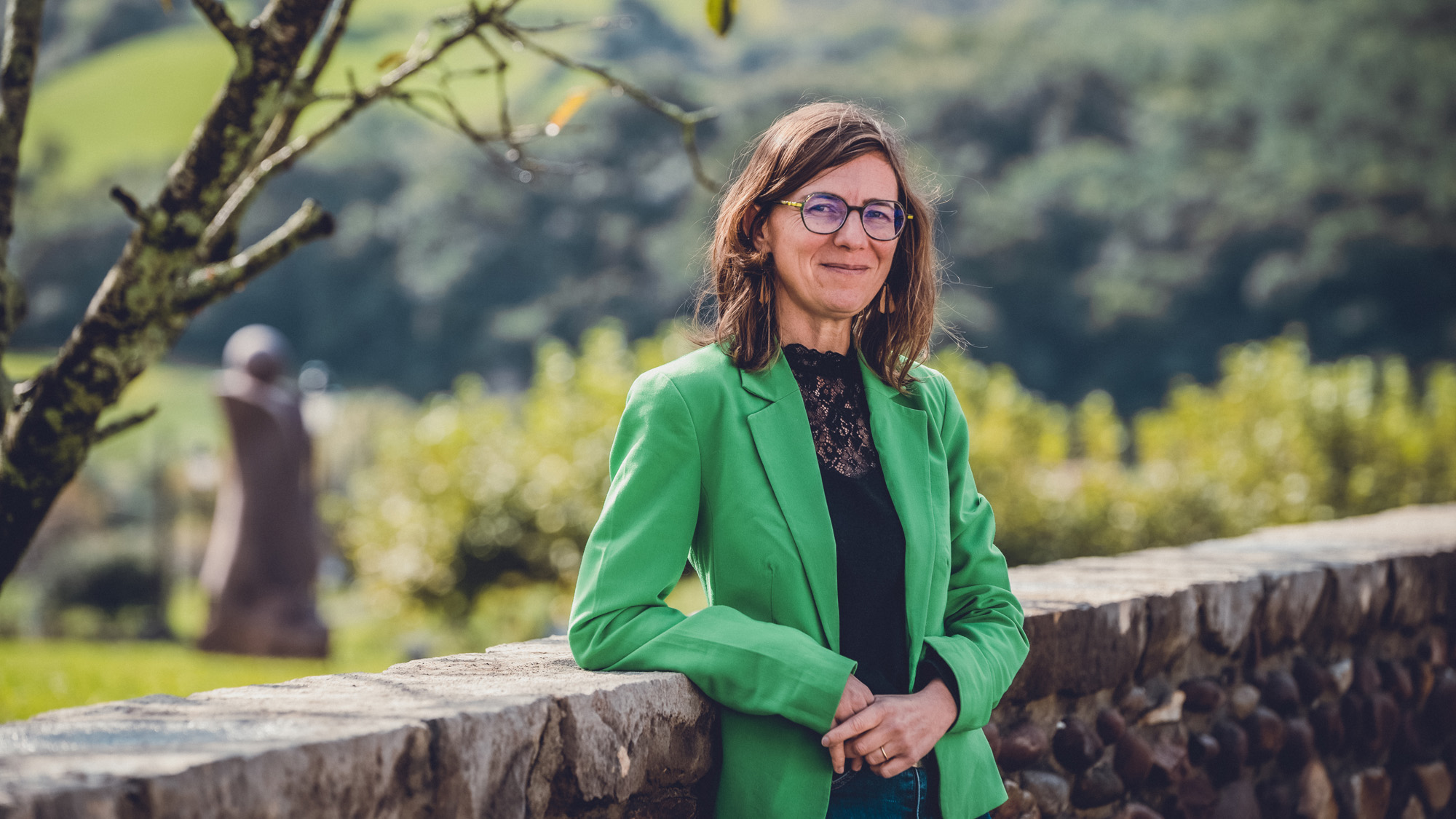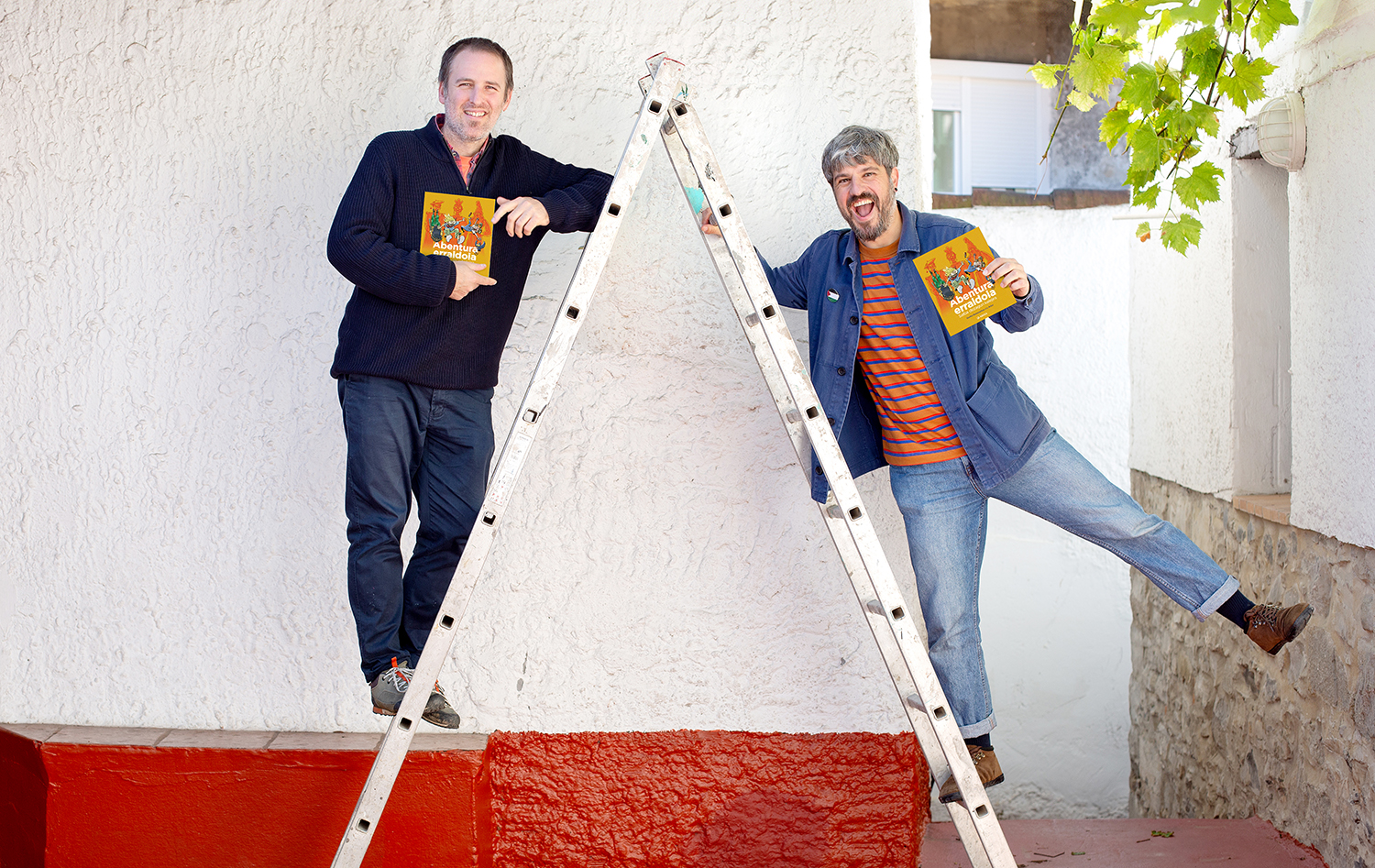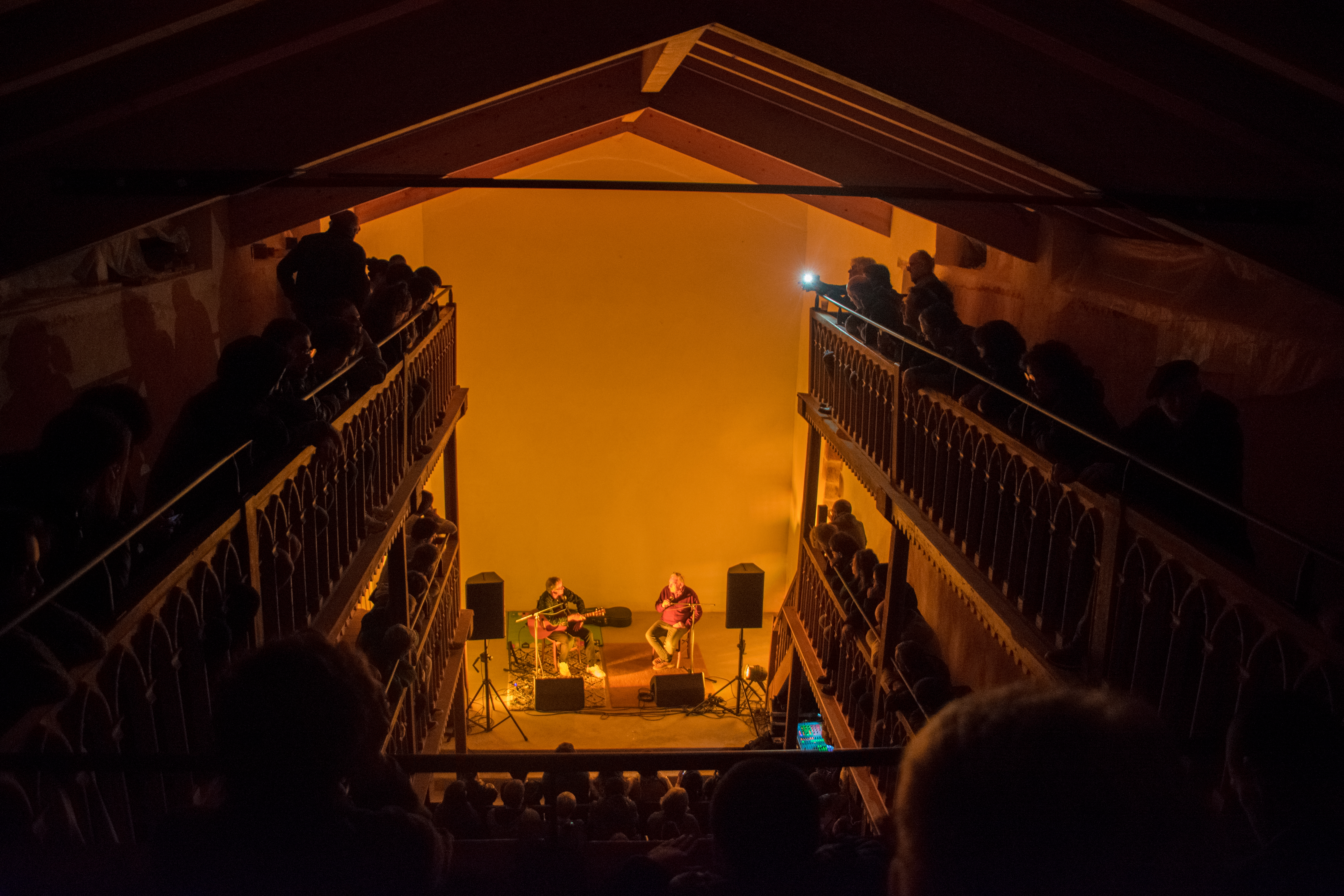"We are no longer able to transmit a living language"
- Based on the Quousque Tandem by Jorge Oteiza, Iñaki Segurola has written Sed Quia Sua (Erein, 2020). He has been copied the cover, the Latin title, the initial offers, the order of the chapters and the consistency of the book. But the crumb is the cider of another barrel. If Oteiza made an aesthetic interpretation of the Basque soul from the stones, Segurola wanted to hear “what this language says for himself.” And by the way, he's removed some nogales along the way: occasionally, really, almost always at recess...
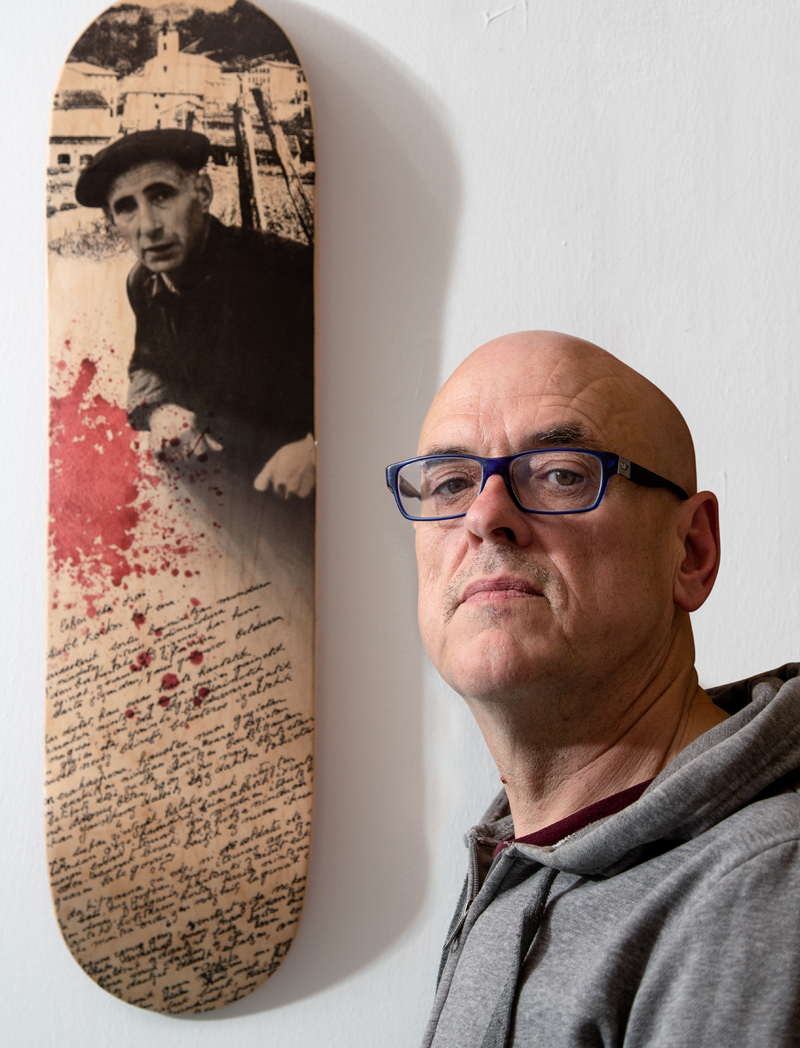
After fifteen years, Iñaki Segurola (Azpeitia, 1962) started listening to the language. He was then an “eccentric teenager”, “who had a hard time finding his place on the street and in society.” He dedicated himself to books, rather than literature, to matters related to language. In the university stage he did not have to think much about choosing studies: he soon enrolled in Basque Philology, in the Vitoria of the 1980s, “amid intense punk agitation”. “But I was a good student.” At first it was dazzled with grammar and syntax, but it ended up in the Basque General Dictionary project, “because that happened.” Since then he has been working there. In addition to collaborating here and there, he has published a series of books, but has never taken as far as listening to the language in Sed Quia Sua. He cited us in the study of Azpeitia's Keizpe tattoos: “There is no skate anywhere with the image of Xalbador!” As usual, it has appeared sharp.
I had never seen such a thing. Old people and young people have been presented with the book differently. To the former you have told them that you have tried to write “Quousque Tandem del Euskera”, while to the latter this book is an “arigune decolonial”.
That's right. It was the initial intention: this will be my Quousque Tandem; Oteiza from the stones, I from the tongue. Then I realized that people don't know Quousque Tandem. Those under the age of 50 to 60 have not read it – with the exception of some of the Fine Arts – and among the elderly, from start to finish, very few have read it. So what was the point of saying that this is my Quousque Tandem of the Basque Country? People don't say anything about that. As a salesman, I thought: if you don't understand Oteiza, if you don't understand Oteiza, maybe you understand that this is a decolonization of the ridiculous language, an attempt to get rid of the craca of the proudly Western reason of modernity that I call harrazoi and listen to what the language says of itself.
Decolonized Arigune. You'll have stayed at ease.
I thought they would tell me that. What do I have to say? In addition, if you start the original Basque enthusiasm up and down, people will say: “What does this do? On which planet is it?” I don't know if I think...
Yes, at least listening to the original Basque enthusiasm, it seems that you are looking for an original pure essence.
This book is not essentialist, it is ultra-essentialist. This film that I've invented might have entered Euzko Gogoa 80 years ago, but if it had been published 50 years ago it would also have been outdated. Tandem in person: “Aesthetic of the Basque soul”. Think about where it's left today. Now people's Progra looks at migrants and racists.

You appear as an anarcho-abertzale. And in a moment you say that trying to hear the tongue is trying to treat the anarcho-abertzale situation. What does each other have to do with each other?
As Benjamin Lee Whorf said, all words are painful, and the defining words are even more painful. I've been saying for a long time that I'm not an Abertzale, but now I've realized that suddenly no one is an Abertzale, that everyone is a feminist or a communist. So, to contradict me a little, I say I'm Abertzale. For me it is the Abertzale that has attachment to the land and to the tongue, without any other strange explanation, which I owe to the people of Iparralde. And I, there, everything. On the other hand, I am not a pure anarchist, I am not an Asel Luzarraga, but I have an anarchical character; you know, I questioned what he commands, the less better, etc. What does that have to do with listening to language? Language has an anarchal spirit, because no one has invented it. It's an invention of the ignorant people. Listening to language is listening to the lack of power. Then academic power arises, etc., and the footprints of power remain in the language. Whatever you want. But that is in itself.
You refer to sincerity. That we are all talking about our condition, saying what can be expected of us.
It is obvious. We're all like this. One speaks and asks: What are you going to say?
Do you not do the same in this book? On the pretext of language, aren't you speaking from your condition?
The speaker always speaks, yes, but language, aside, gives some patterns to speak the world. In any case, if your complaint is that I cheat, I agree. But as I mention in the presentation, I guess I've been bored to pronounce my opinion and I don't want to write a book of convictions, but I want to be elucidant about a being or a peak.
You claim an etymology that is not considered an etymology. What are you talking about?
Juan Martín Elexpuru and they are revolving around the origin of the Basque language, but the origin of the language cannot be reached. There's no Big Bang in linguistics. So what are they doing? 1,500-2,000 years ago talking about what things were like. That tells me nothing; change can happen right now. What is that other etymology? For example, “samur”. I do not begin to analyze what is “sa” and what is “mur”, but I say that “samur” means “easy” in some places and “soft” in others. From what common basis has this faded? This is the vision I'm interested in: synchronously, out of time, feeling those bonds.
It contradicts the old Basque spirit – the world of matter – and the contemporary spirit – the world of things. It's one of the fundamental distinctions of the book.
Yes. In that listening to language, I reconstruct that in the Basque mind the world was composed of themes. What is it capable of? The theme adopts in a potentiality the items that make up the world, more than in reality. On the contrary, things take those more facts, finer, finer. This is related to physics. In 20th-century physics, especially in quantum mechanics, how objects change from real beings to potential beings. And that's where I create my film. I have a physicist for the cape, Iñigo Urizar Lanz, and I've been standing with him for years every week. He doesn't agree with everything I say, but good.
“The Bectso world is a performance of sterile consensus that moves around the great ideas of the time”
The second fundamental difference is that, as you say, everything has gone from "everything and not everything" to "everything".
“What they are and they are not” does not enter the phonoteca of my ears. Not even “for that” – although this belongs to the realm of causality –. And if it doesn't get into my ears, it hardly does in tradition. So, translated into language, I say there is always something out of a “denfinite denture.” The case is so, and it has not been a medical diagnosis, be it the origin of life. It's always something, and not. And there I caught myself, because even when I say “the language says it,” the language says it, and not. Everything is like that.
Has the Basque Country entered the extinct era?
José Ignacio Hualde wrote it and there was also intense debate in 31 of the hand. It was hard to hear, but I read the article and thought, “That’s right.” Since then I have used extinct, therefore, with heart pain. What is extinct? A loss in the vitality of language, in autonomy, in the ability to create new things. I've lived it like this. When I write, I realize: “You can’t put this anymore, you don’t understand.” The same is true of all linguistic barriers. Demographic change, our on-screen way of life, brings us to it: Castilian, French and English is almost everything that is introduced to a young speaker through the eyes and ears. If before it was difficult to revive, now it is impossible, because you cannot resist this rain.
Isn't that a very negative message?
The Catalans are also saying the same thing, where use has dropped by ten points in fifteen years. I mention Juliana Canet, 21, instagramer. He says: “If I bring children, I probably won’t speak Catalan. We are the last.” We are no longer able to convey a living language. I realize that many people don't live this way, but what always happens is where you live: if for you the Basque is something of the books, and if you live the street or the world in Spanish, you don't realize it. But I'm from here.
They say you can't embrace fat ideas -- IdPot. What are those ideas?
- anything that has the suffix - astigmatism and with which I doubt. This is so true, that even those who feel comfortable in the isms, on many occasions, pluralize them – feminisms. An IdPot is something that explains everything: communism, Marxism, Christianity, the Big Bang theory… I drown in them. I could not in the time of the Basque gudaris, of HB and of ETA, and I cannot in the current communist revival.
It's a contemporary question: So where do you talk about it?
From the couch of a Tattoo store.

When speaking of language, when saying that this book is “decoded”, is it not responding indirectly to that?
Yes, I'm talking about language, but jokingly semi-real. Am I in the trap? It's possible. In any case, I think you are at a certain age in IdPot and suddenly it looks like you're something else. I wanted to be a Chomskian linguist. As Oteiza would say, the lack of chromlech is to approach some cheap schemes, the whole denfinite of denkeria is to approach a short explanatory. Things are never like that.
Where is the “feminist word police”?
I think there's a feminist word cop, but it's always been. “I don’t know what word you’ve used,” “you’ve said a man but you only had the sis-men in your head.” Language is not words; language is what has been said, what you are saying, what you want to convey in every situation. If all the words are judicialised, I cannot continue to speak. I believe that the few loose words should be depolarised and unjudicialised. Listen, please.
Isn't it just that some ideas are more confronted than before?
But I'm talking about words. And yes, of course, choosing the right words is important, but on many occasions it seems to me that there is a judicialization that makes communication difficult. It's not just about feminism. In that world of the Left, Abertzale was also said very carefully, or at other times with religious issues…
“I believe that we must depoliticize and de-criminalize the few loose words. Listen, please.”
Another shot: you say that greed here is a loose Spanish.
I've always felt this way. "Long live us and ours!" It's always given me infinite disgust. I say it's Spanish, because that's not in the North. There he shouted “long live you!” or “long live you!”. I haven't done any research, but the difference is obvious. The same applies to ETA and Iparretarrak. I have always been anti-ETA, and I was greatly helped by those in the North, who were called nationalists. For example, Allande Socarros said it very quiet, and so did I. The armed struggles were totally different from those of ETA and Iparralde. They had nothing to do with it. The North seemed beautiful to me. It had never been a company that billed the dead. Linked to the concrete purposes in which attacks were carried out, now I don’t know what about nature, now we are going to spoil this house… There were some deaths in the shootings, but that was not the goal. Nothing to do with ETA. Autonomous Commands were also something similar to the beginning; then they started competing with ETA.
As you mentioned, contemporary bertsolari isn't ours, but it's one of ours. Why?
Oteiza has a sentence: What's the point of a soft friendship that leads to a sterile deal? And the grassy world is the performance of that sterile deal that moves around IdPot or semidIdPot of the time. Before, the Bertsolaris on the right, Xabier Euzkitze and, did not manage to break that consensus – that does not mean that I was in favour of Euzkitze; to the extent that the consensus was broken, I found it interesting. Andoni Egaña is another; I do not understand how he has always managed to stay there. I am waiting for Xabier to finally return to Silveira and say that the world is small and there is no virus. Or I want, for example, to fuck Aitor Bizkarra or Maddi Sarasua. But do not get bothered by annoying yourself, but see if you are able to break that sterile agreement from your socialist line, creating a little discomfort.
How many bertsolarism sessions have you gone out of the competition?
You've caught me. But I cannot with that Basque Mass. You know that nobody there is going to say anything dangerous, that nobody is going to break it. In addition, the championship is enough for me. And what I find most difficult to support is the sciences of bertsolarism: Etxenike and the company, and the bertsolaris afterwards, as buffets, before the supreme sage. You don't have to endure it.
There is no contemporary bertsolari that surprises us, you said it. None?
Except for Iker Zubeldia. Well, there's more. But in general, I have the feeling that contemporary Bertsolarism is the language we read in the press or in the books, measured and interrupted. I'm not surprised, they all come from a similar world, I know more or less what they're going to say: now immigrants, now transfeminism… What Argia shows, more or less. I cannot support this generous and accommodating unanimity. But he has no choice, and if I were a bertsolari it would be.
You say of yourself that you know nothing but throw away contradictory tacos. Why should I buy a book from someone who doesn't believe in anything?
Because something will move within him, because he will hear something, which knows neither where or where he is going to come from. The one who knows all that I don't know knows knows knows knows, knows where it's going and where it's going, and that's not funny. This book is in that unfulfilled capacity, extended to everything and not to everything, and without being able to despair in an IdPot. Now, I think I've mimicked Oteiza too well, and the book is too thick for me: so many philosophical questions, word games, poetization -- I didn't have to mimic it so well. On the one hand, it's throwing flowers to myself, but it's also throwing the shit at me. I've thought about taking out a lightweight 80-page edition of the book, explaining the basic schema. But I'm not interested in the schema. What you have to do: you've got to think it's hard, and you've got to surf the book, you've got to play, or you've got to walk around.
Beware of that view of the South. Firstly, to demystify the blind admiration of the green land, the white houses and the red tiles, unconditional love, fetishism associated with speech and the supposed lifestyle. It leaves, as Ruper Ordorika has often heard, a tourist idea... [+]
Let's talk clearly, bluntly, without having to move later to say what I had to say: this game, which consists of putting together the letters in Basque, happened to Axular. Almost as soon as the game is invented, in such a way that in most of Gero's pages the author gives the... [+]







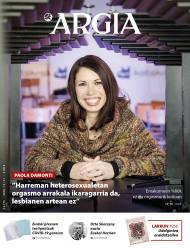


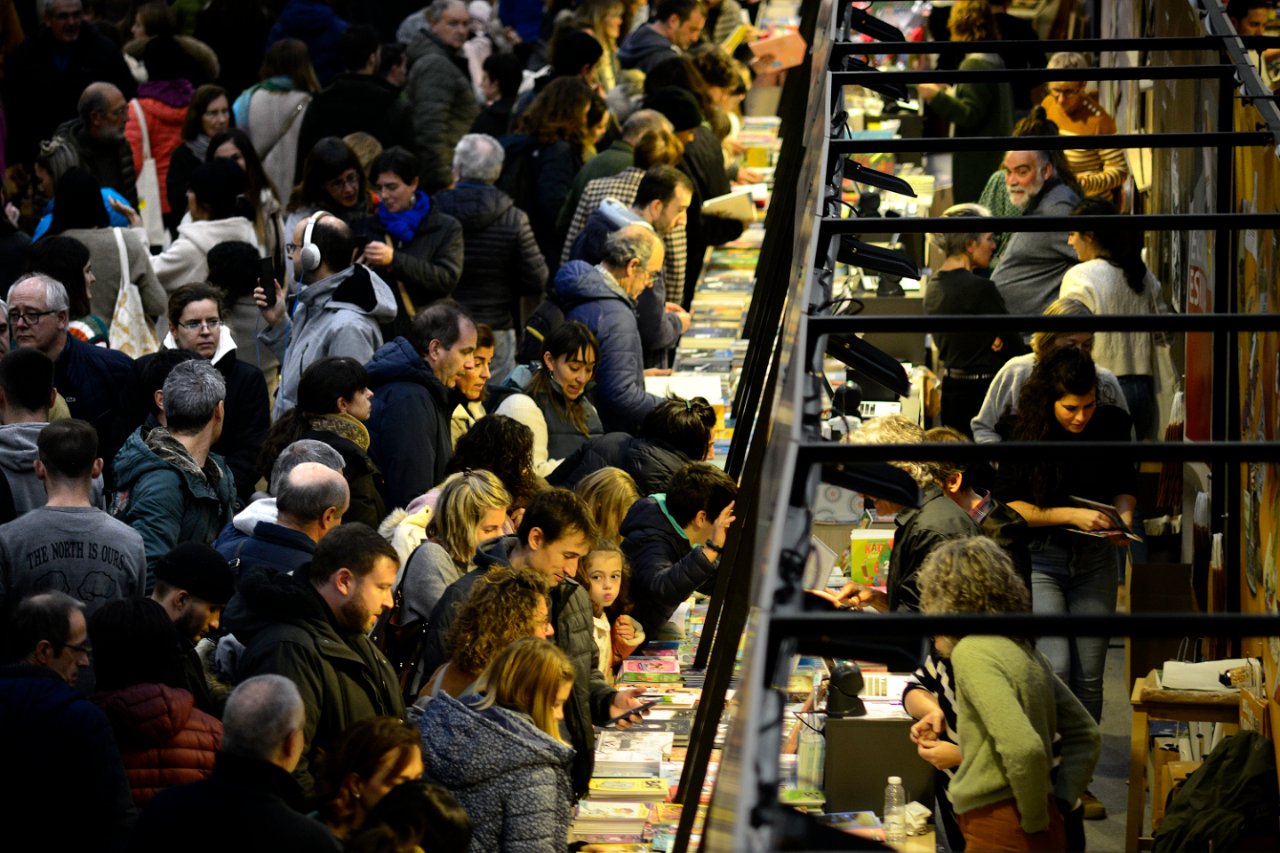



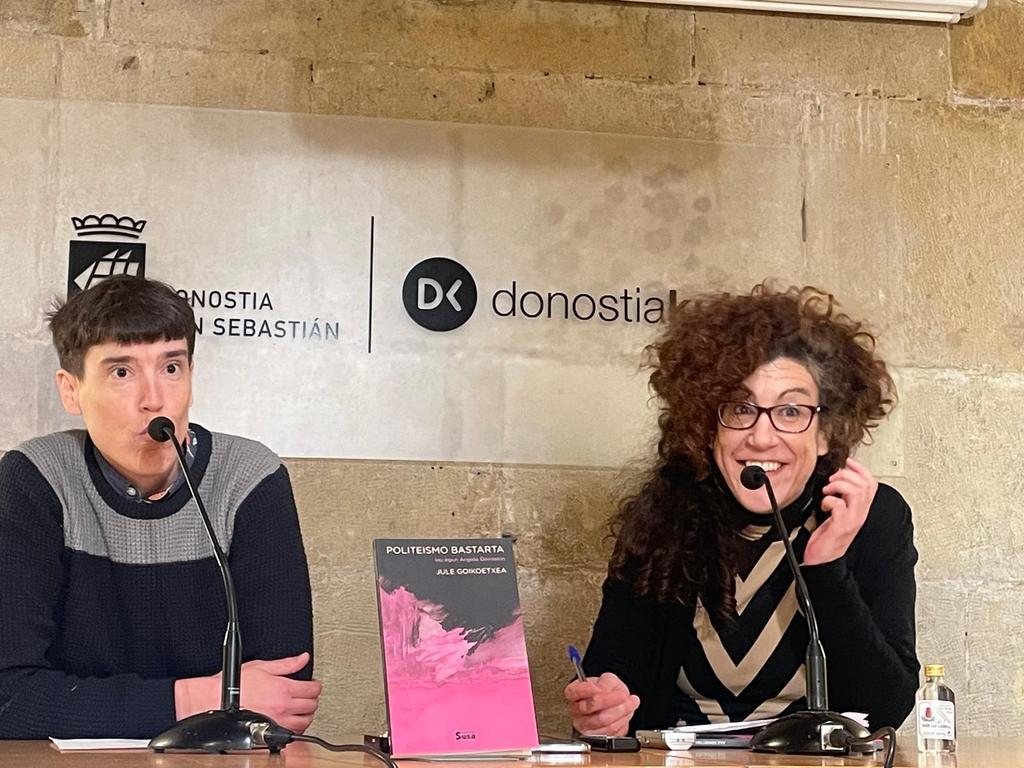

.jpeg)

